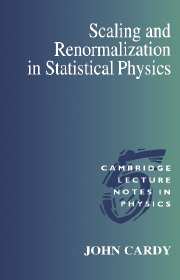Book contents
- Frontmatter
- Dedication
- Contents
- Preface
- 1 Phase transitions in simple Systems
- 2 Mean field theory
- 3 The renormalization group idea
- 4 Phase diagrams and fixed points
- 5 The perturbative renormalization group
- 6 Low dimensional Systems
- 7 Surface critical behaviour
- 8 Random Systems
- 9 Polymer statistics
- 10 Critical dynamics
- 11 Conformal symmetry
- Appendix: Gaussian Integration
- Selected Bibliography
- Index
8 - Random Systems
Published online by Cambridge University Press: 05 February 2015
- Frontmatter
- Dedication
- Contents
- Preface
- 1 Phase transitions in simple Systems
- 2 Mean field theory
- 3 The renormalization group idea
- 4 Phase diagrams and fixed points
- 5 The perturbative renormalization group
- 6 Low dimensional Systems
- 7 Surface critical behaviour
- 8 Random Systems
- 9 Polymer statistics
- 10 Critical dynamics
- 11 Conformal symmetry
- Appendix: Gaussian Integration
- Selected Bibliography
- Index
Summary
Quenched and annealed disorder
The systems discussed so far have been assumed to be homogeneous. Any real system will inevitably contain impurities. In most circumstances, one tries to eliminate them, but, under well controlled conditions, it is also interesting to study their effect on critical behaviour. In general, one would expect any kind of random in homogeneities to tend to disorder the system, and thus to lower the critical temperature. In fact, under certain circumstances, randomness may completely eliminate the ordered phase. Under other conditions, it is still possible for the system to order, but the universality class of the critical behaviour may be modified.
The first point to be made concerns the important distinction between annealed and quenched disorder. As a concrete example, suppose that we substitute some non-magnetic impurity atoms into a lattice of magnetic ions. The way we might do this is to mix some fraction of impurities into the melt, and let the system crystallise by cooling. If we allow this to happen very slowly, the impurities and the magnetic ions will remain in thermal equilibrium with each other, and the resulting distribution of impurities will be Gibbsian, governed by the final temperature and the various interactions between the different kinds of atom. Such a distribution of impurities is called annealed.
- Type
- Chapter
- Information
- Scaling and Renormalization in Statistical Physics , pp. 145 - 168Publisher: Cambridge University PressPrint publication year: 1996

